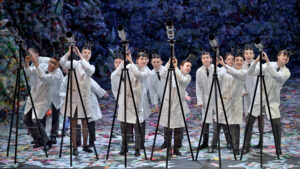
Opéra Comique 2023 Review: Voyage Dans la Lune
By João Marcos CopertinoPeter Brook, in his book “Empty Stage,” once commented on the impossible equation that is theater, especially opera:
“At the Metropolitan Opera in New York in a brand-new building the best of Europe’s singers under the baton of the best Mozart conductor, and organized by the best producer, play a “Magic Flute.” […] The [opera] ticket is ‘hot’—but what is the evening worth? In a sense, all forms of audience wooing flirt dangerously with this same proposition—come and share in the good life which is good, because it has to be good, because it contains the best.”
There is much truth in his words. Nowadays, most opera houses employ this “Met” style, which seems to have become the norm: “it has to be good, because it contains the best.” Brook knows the Met rule is not true, and Opéra Comique’s “Le Voyage dans la Lune” proves how much the non-optimal can makes things quite good.
Winning Over the Crowd
This production featured, in contrast to the usually stellar cast of Opéra-Comique, mostly young singers from their music education program. That means that much of the singing could be considered below normal expectations even for an academic operatic production. But the joy that emanated from the stage and contaminated the audience was evident. If the role of a critic is to call for competence, then the evening left much to criticize. Yet by other critical standards, the evening was a success. Their success came from artists seeking their best, in spite of their not being the best right now. The audience was receptive to such an approach.
Arguably the most striking aspect of the production was how all the cast—from the chorus to the soloists—attended to their physical movements. Their chorography on the stage was stylized and caricatured, but always enjoyable to watch. It made the performance more theatrical than operatic. This shift towards emphasizing the (so important) theatrical aspect of Offenbach leads an audience to concentrate on textual details and musical expressivity rather than on vocal training.
Few stage directors know more about Offenbach than Laurent Pelly, and this production—competently re-staged under the good hands of Héloïse Sérazin—showed Offenbach’s power at its best. The scenarios and costumes promoted the ridiculousness of the plot at its best. Pelly also criticizes how we humans have made earth into a dystopian garbage pile—like in “Wall-E.”
Stars of the Night
On the vocal cast, it is undeniable that King V’lan by Franck Leguèrinel was the most seasoned singer on the stage. His V’lan was funny, but musically generous to his peers.
Ludmilla Bouakkaz’ princess Fantasia managed to make comedy of her role, and its long melismatic lines. She used breathing pauses wisely.
Mateo Vincent-Denoble’s Microscope had great vocal projection and a charismatic stage presence.
Although Arthur Roussel was, vocally, the greenest member of the main cast, he had great moments in his love duo with Fantasia.
The singers that were members of Opéra-Comique’s Maîtrise Populaire were all compelling. Enzo Bishop probably wore the funniest costume of the night: he was a white globe as the moon. I particularly enjoyed the quintet of chamber ladies in the lunar court: Salomé Baslé, Justine Chauzy de Joly, Judith Gasnier, Airelle Groleau, and Maxence Herman.
But all this joy would not be possible were it not for the impressively professional musicians in Les Frivolités Parisiennes. Their wind section brought solemnity to a score that, otherwise, could only be a simple comedy
Whatever achievement it represented for the Maîtrise populaire’s students, this Offenbach featured truly great conducting. Sarah Koné managed to make the chorus sound uniform, coordinated, and theatrical. Alexandra Cravero proved herself to be an amazing conductor, bringing out within the usual comic wittiness an unexpected solemn tone unexpected. The opera’s closing salutation to earth (“Claire Terre”) became both an appreciation of our planet and also a serious reflection: the earth is still something amazing, in spite of our best efforts to destroy it. I credit all the musicians, but especially Cravero, with such a great achievement.


